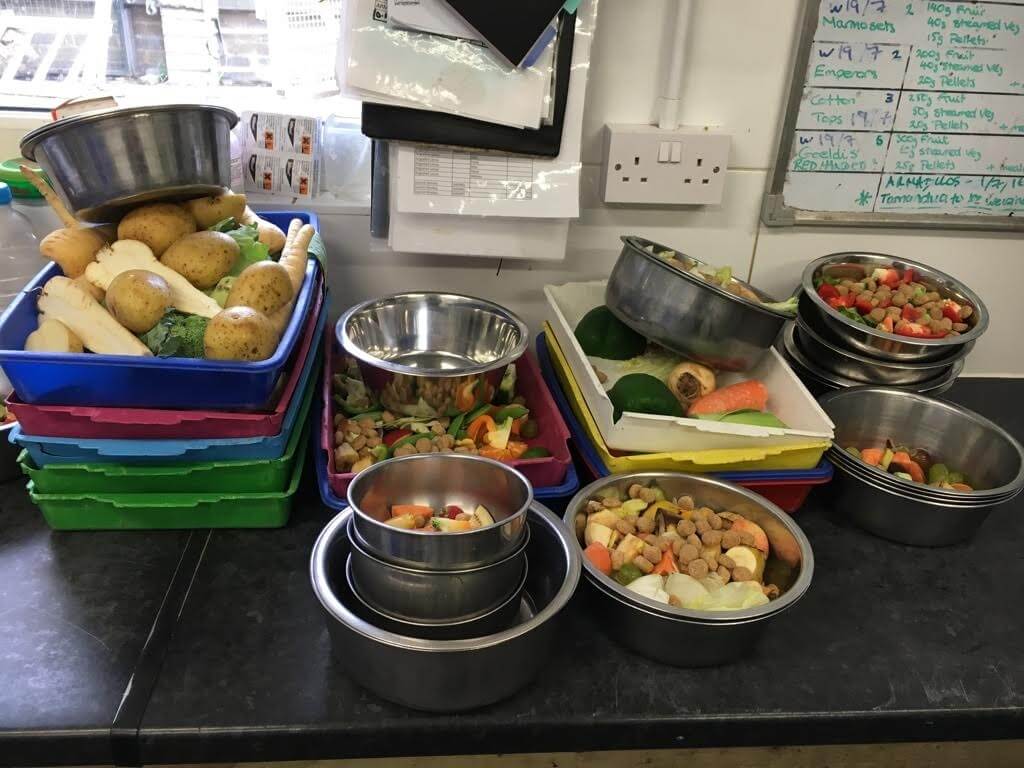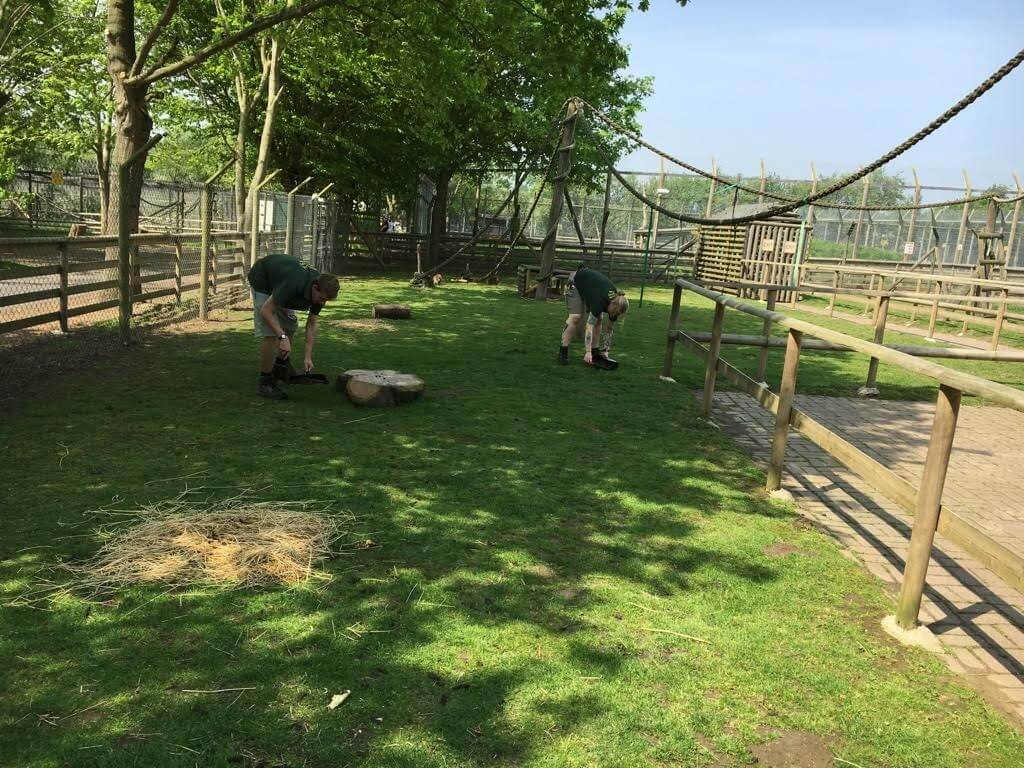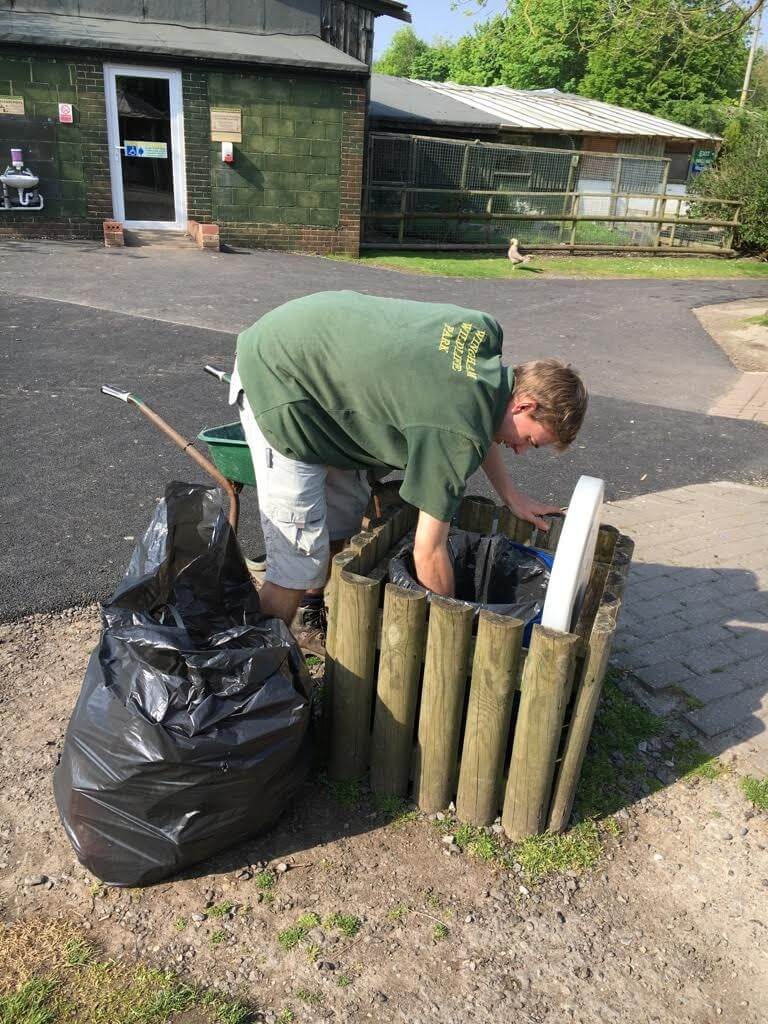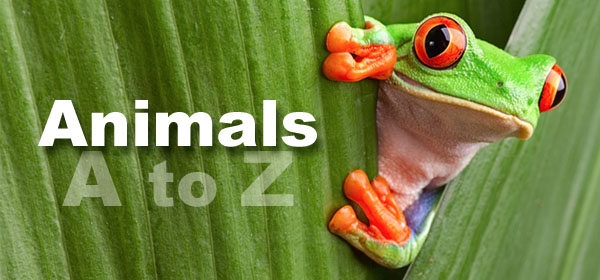People have many different perceptions of what working as a zookeeper actually involves, however by far the most overwhelming conception (or rather should I say misconception) I encounter is something along the lines of “Wow you get paid to play with/cuddle animals all day, you have the best job in the world!”. Now while the first half of that statement couldn’t be further from the truth, it certainly doesn’t prevent the latter from being true – zookeeping is a hugely rewarding career and any zookeeper you ask will more than likely tell you it is indeed the best job in the world, but it is also much more hard work and much less cuddling than you might think!
For both the best interests of the animals, and also the safety of us keepers, hands on contact with the animals is actually extremely limited with the majority of our species, particularly on the primate and carnivore sections. Whilst many of our animals look irresistibly cute and fluffy, we’d probably be a few fingers down, or worse, if we went in for the hug. There are of course a few exceptions, with some of our hand-reared animals or a few of our particularly friendly individuals who are always looking to sneak a little human affection. However this doesn’t stop us from forming rewarding relationships with all of our animals, after all we do spend more of our waking hours with our animals than we do with our own families! We devote so much of our lives to caring for these animals, and it’s the bonds we form with them that make the job worthwhile.
So then, what does a zookeeper actually do all day?
In a typical work day there’s a whole range of different things we might have to do. There are a strict set of tasks which are essential to be completed every day such as food preparation, feeding, watering, cleaning and maintaining enclosures, health checks and enrichment. And of course, none of these are “weather permitting”; torrential rain, sub-zero temperatures, snow, wind or burning heat, they’ll still need to be done, so if you’re like me and a bit of a chicken when it comes to the cold weather, you have to learn to man-up pretty fast! However this by no means covers everything the job entails – when the fruit and veg delivery comes in, it all needs sorting into crates by type, when the dry food delivery comes in, all 40+ 25kg bags need moving into the container by hand, staff areas continually need cleaning throughout the whirlwind of a busy team of keepers and volunteers using them, enclosures often need new wood chip putting in (wood chippings are heavier than they look by the way!) paths need sweeping, leaves need raking – the list is endless, and it’s no wonder many of us have adopted new bedtimes of around 9pm despite almost all being in our twenties.
So to give you all a greater insight into how Zookeepers actually spend their days, here’s an inside look at a typical day on the primate section at Wingham Wildlife Park:
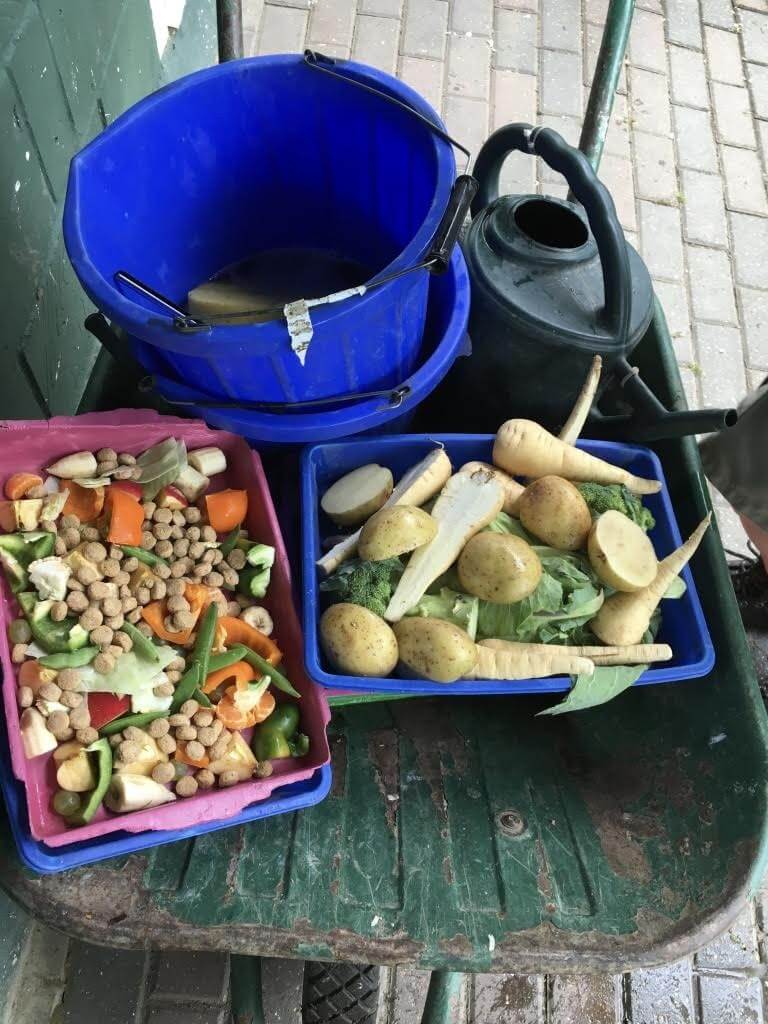 8.00am – Morning feeds. The first task of the day is delivering breakfast to 60+ hungry primates – the phrase “feeding time at the zoo” exists for a reason as everyone is particularly impatient for their food at this time, especially the ring-tailed lemurs who generally decide to help themselves from their food trays before you even make it to the feeding stations. The feeds are all chopped the day before so it’s straight to loading the wheelbarrows (learning to stack a wheelbarrow perfectly at way beyond it’s apparent capacity is a valuable skill you’ll never have thought you needed) and starting the rounds. Observations, head counts and health checks are all carried out at this time to ensure all is well before opening. Cleaning buckets come too as all interior enclosures are given a quick clean during the round, we wouldn’t want to eat from a dirty dinner table and so neither should our animals.
8.00am – Morning feeds. The first task of the day is delivering breakfast to 60+ hungry primates – the phrase “feeding time at the zoo” exists for a reason as everyone is particularly impatient for their food at this time, especially the ring-tailed lemurs who generally decide to help themselves from their food trays before you even make it to the feeding stations. The feeds are all chopped the day before so it’s straight to loading the wheelbarrows (learning to stack a wheelbarrow perfectly at way beyond it’s apparent capacity is a valuable skill you’ll never have thought you needed) and starting the rounds. Observations, head counts and health checks are all carried out at this time to ensure all is well before opening. Cleaning buckets come too as all interior enclosures are given a quick clean during the round, we wouldn’t want to eat from a dirty dinner table and so neither should our animals.
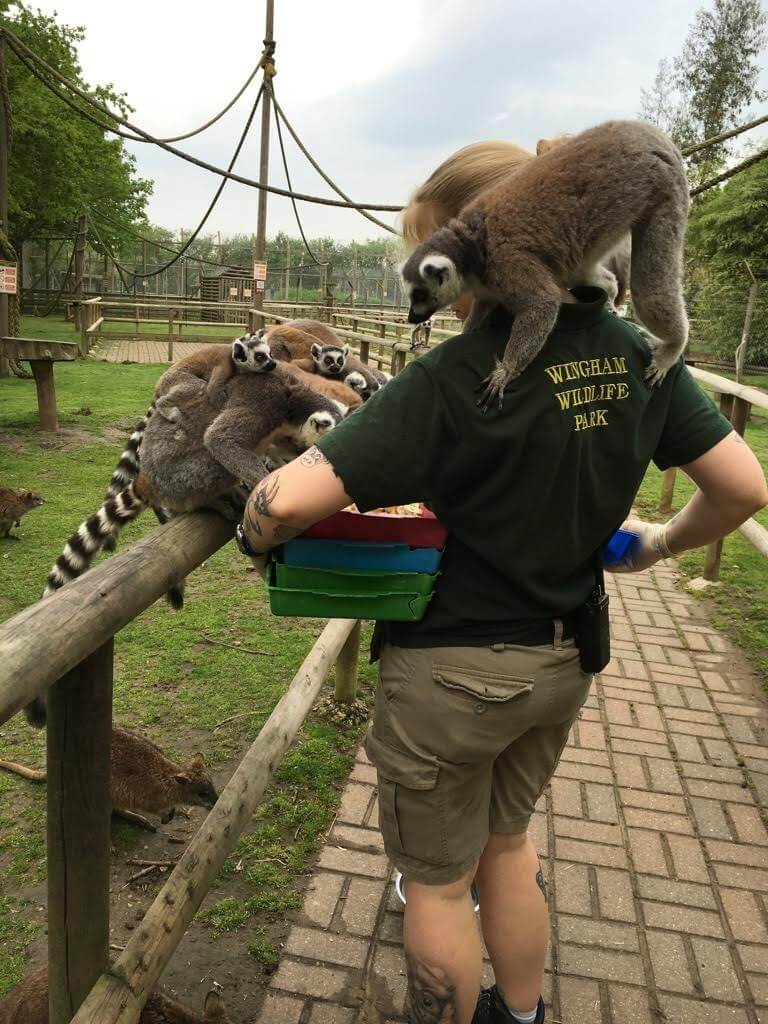
10.00am – Morning break. Chance for a much needed cup of coffee, for coffee addicts like myself.
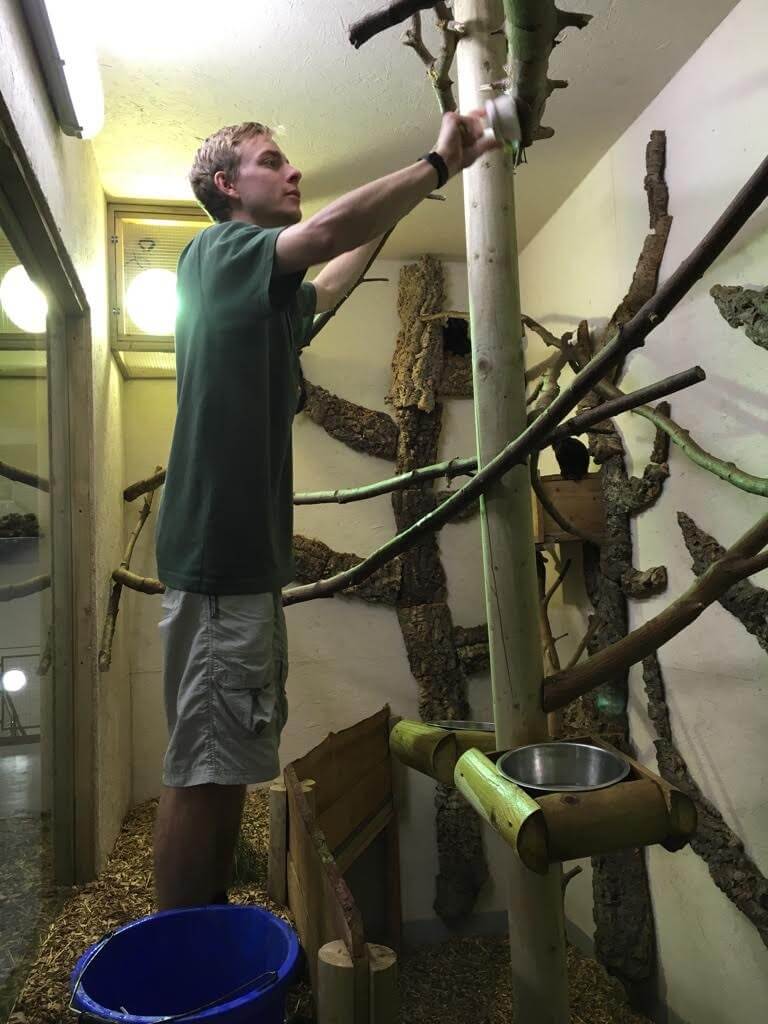 10.15am – Cleaning. A showcase of the most glamorous part of the job, for sure. All enclosures on the primate section are on a five day rota for full cleans, this means a full scrub from floor to ceiling on the interior, substrate change and thorough exterior clean up too. This part of the day usually results in us leaving work with a distinct aroma of “monkey” that everyone around us can smell except us, and with uniforms covered in things that have actually incited my mother to ban me from touching all furniture in the house until changing and showering when I get home. It is however a great chance to spend some time watching the animals while you’re working and learning more about their behaviour, so every cloud has a silver lining.
10.15am – Cleaning. A showcase of the most glamorous part of the job, for sure. All enclosures on the primate section are on a five day rota for full cleans, this means a full scrub from floor to ceiling on the interior, substrate change and thorough exterior clean up too. This part of the day usually results in us leaving work with a distinct aroma of “monkey” that everyone around us can smell except us, and with uniforms covered in things that have actually incited my mother to ban me from touching all furniture in the house until changing and showering when I get home. It is however a great chance to spend some time watching the animals while you’re working and learning more about their behaviour, so every cloud has a silver lining.
11.30am – Primate Block Talk. Giving public talks is an important part of the day as it gives us a chance to educate guests about our animals and generally share our passion and expertise with people who share our interests.
12.00pm – Lunch break.
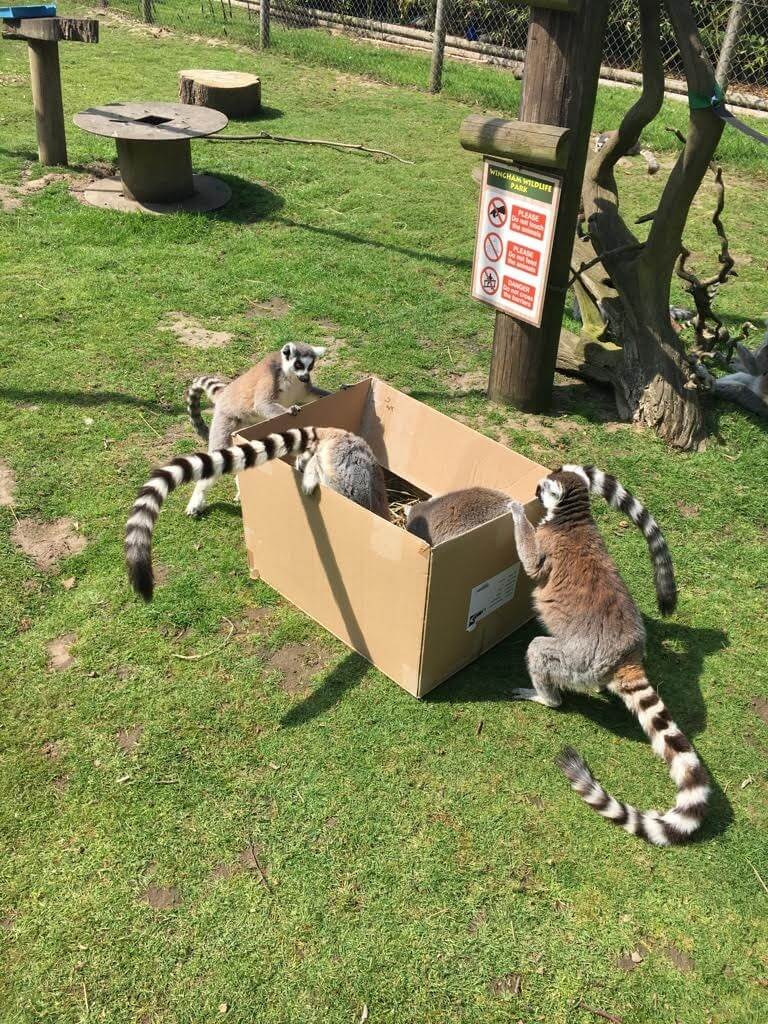 12.30pm – Supervising the Lemur walkthrough enclosure. If we don’t have volunteers in that day, then the primate keepers take the responsibility of supervising the walkthrough enclosure and share shifts among ourselves. Another great chance to talk to guests, and also spend some time observing the lemurs, although unfortunately much of our time in here is spent observing and intervening when guests attempt to stroke the lemurs!
12.30pm – Supervising the Lemur walkthrough enclosure. If we don’t have volunteers in that day, then the primate keepers take the responsibility of supervising the walkthrough enclosure and share shifts among ourselves. Another great chance to talk to guests, and also spend some time observing the lemurs, although unfortunately much of our time in here is spent observing and intervening when guests attempt to stroke the lemurs!
1.00pm – Additional jobs, enrichment and training. Any extra jobs that need doing can be done during this time, however whenever we get the chance, we devote this time in the afternoon to enrichment and training. Both are extremely important for the mental well-being of our animals, especially so on the primate section due to their high intelligence. We’re constantly racking our brains to come up with new and interesting ways we can enrich their lives, novel puzzles we can build, alternative ways to deliver food, alterations to enclosures and so on. For me, this is by far the most rewarding part of the day as it really gives you a chance to interact with your animals and see the benefits of your hard work. This is probably the one part of the day where we actually get to do all the things people imagine us to be doing all the time.
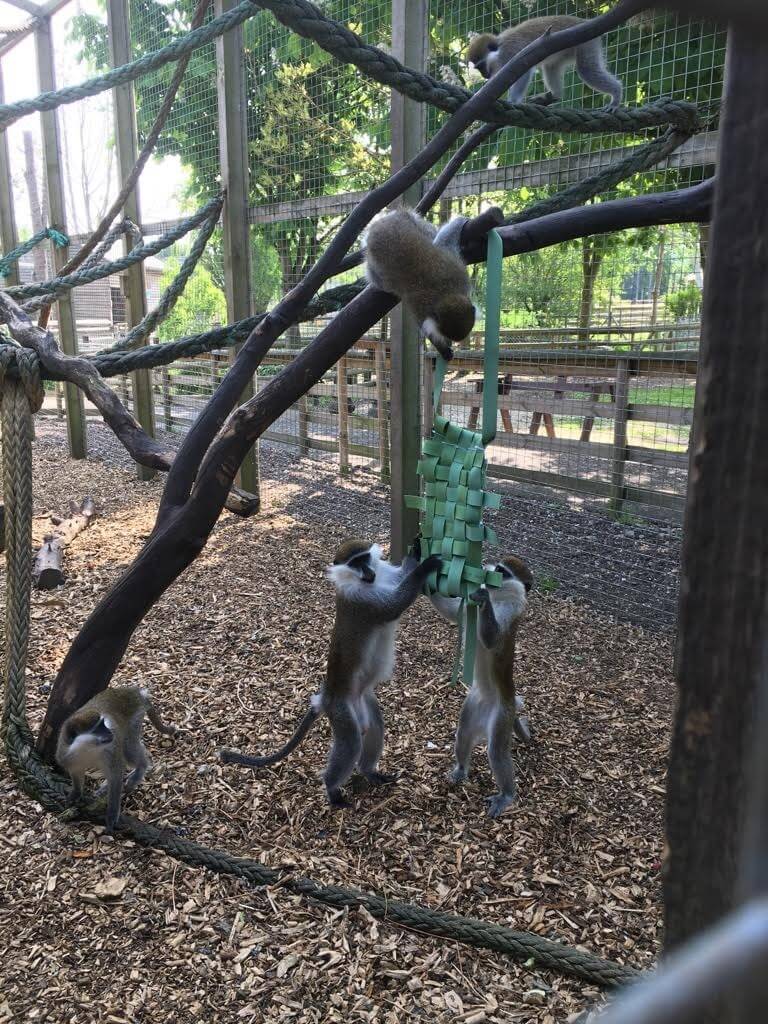
3.00pm – Food preparation and chopping for the next day.
4.00pm – Afternoon break. Another cup of coffee!
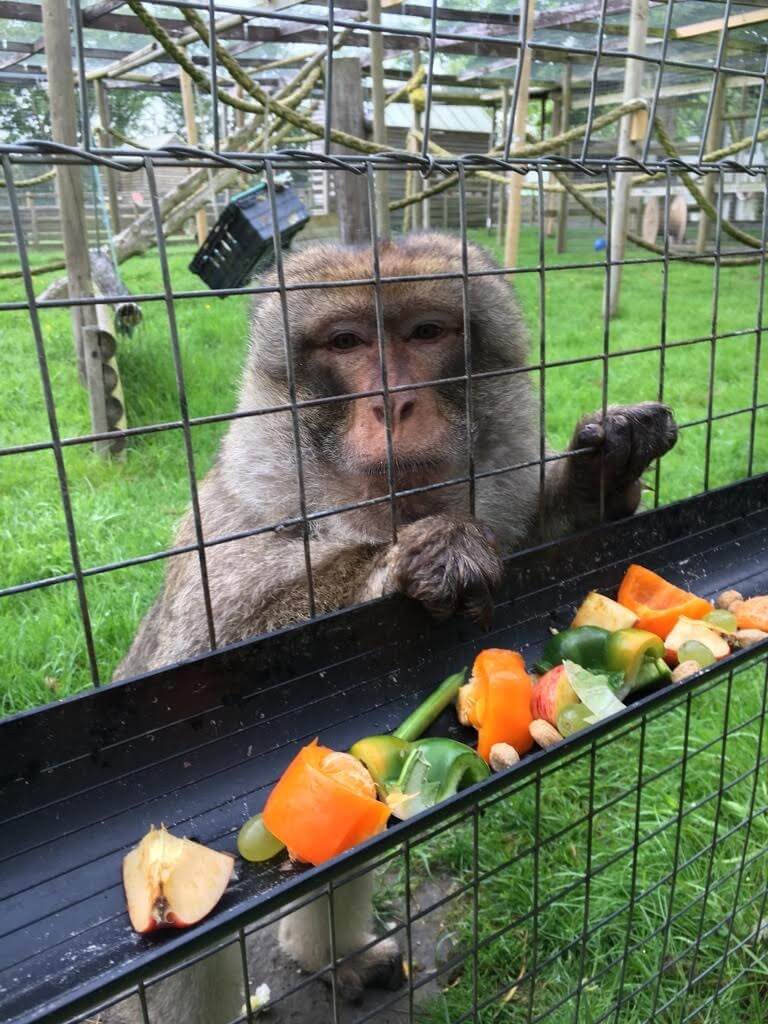 4.15pm – Second feeds and bin round. All of the larger primates on the section get a second feed in the afternoon to keep them going overnight, so wheelbarrows are loaded up again and dinner is delivered. Access is given or limited to certain areas depending on species and all locks are given final checks. The rubbish bins in the park also need emptying and yes, that’s a job that falls under the responsibility of the keepers. It’s certainly not highlight of the day, particularly during the busy periods when we often find ourselves elbow deep in dirty nappies (guests that tie them up in neat little bags get brownie points from us!), but it’s a job that needs doing and at Wingham we all chip in and take pride in keeping the park clean and tidy.
4.15pm – Second feeds and bin round. All of the larger primates on the section get a second feed in the afternoon to keep them going overnight, so wheelbarrows are loaded up again and dinner is delivered. Access is given or limited to certain areas depending on species and all locks are given final checks. The rubbish bins in the park also need emptying and yes, that’s a job that falls under the responsibility of the keepers. It’s certainly not highlight of the day, particularly during the busy periods when we often find ourselves elbow deep in dirty nappies (guests that tie them up in neat little bags get brownie points from us!), but it’s a job that needs doing and at Wingham we all chip in and take pride in keeping the park clean and tidy.
4.45pm – General clean up of equipment and the Keeper’s Kitchen. Throughout a full day’s work you can probably imagine that our kitchen takes a slight battering in terms of tidiness. So at the end of the day, all the keepers need to give it a thorough clean. The floor has to be scrubbed and mopped, a particularly long job during the winter after we’ve all been trudging through muddy enclosures all day, equipment gets packed away and there are stacks and stacks of washing up to get through. Washing up is something we spend many hours doing throughout the week; hundreds of animals with multiple feeds per day gives way to a pretty impressive stack of bowls and trays which we all wash up by hand.
5.30pm – Work finishes. Time to go home for an extra long shower and an extra large dinner! That is of course if the day has gone smoothly, sometimes animals don’t always do what you’re hoping, if it’s sunny they may not want to come inside for the evening, or if it’s raining they may decide they don’t want to go out while you put food in for them, and who can blame them? Zookeeping is not the kind of job where the clock strikes 5.30 and off you go, the animals come first here and the whole team stays until all the animals have everything they need.
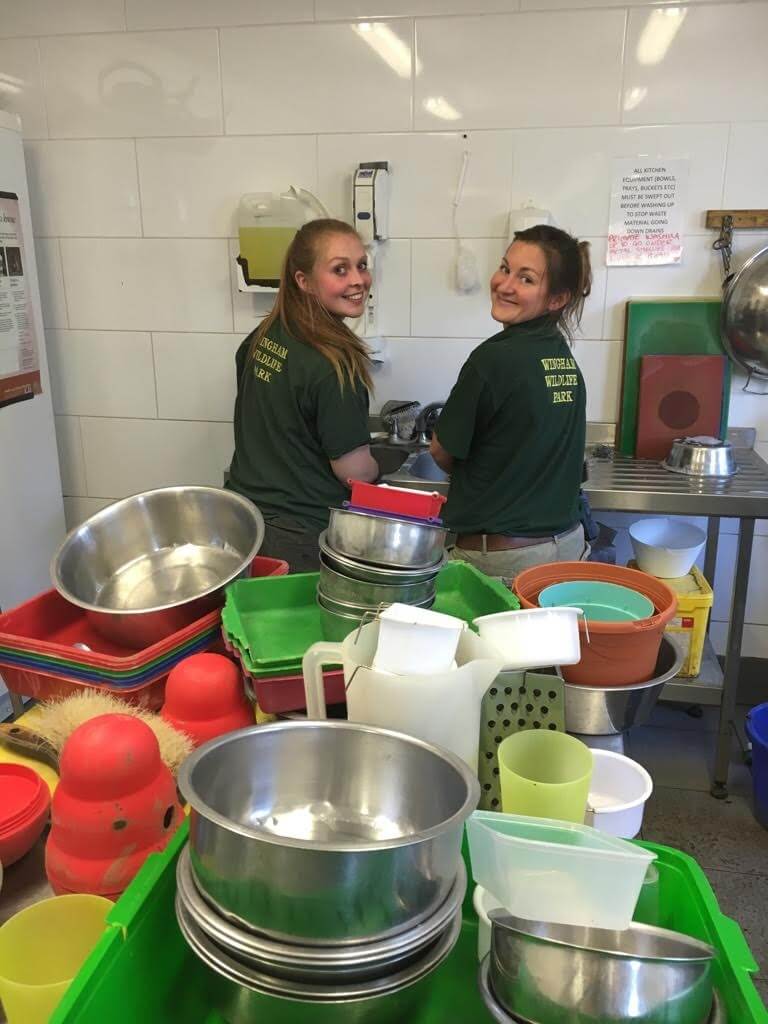
So there you have it, a typical day in the life of a zookeeper. Of course no two days are the same, some days animals might get sick and that takes precedent, other days we may have new arrivals or births that put a smile on everyones face. It’s an ever changing job and it may not be exactly what you expected, but we’re all getting paid to do something we love and that we’re extremely passionate about and we wouldn’t have it any other way.
Want to know how you can become a zoo keeper? Take a look at our ‘how to become a zoo keeper‘ blog!
